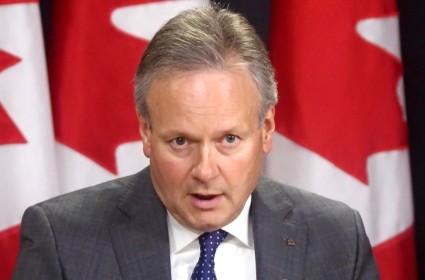 Bank of Canada Governor Stephen Poloz dropped some notable rate-related nuggets in a speech Thursday. Below we ponder the implications of those comments for mortgagors.
Bank of Canada Governor Stephen Poloz dropped some notable rate-related nuggets in a speech Thursday. Below we ponder the implications of those comments for mortgagors.
Here’s what Poloz said:
******
“Inflation expectations have become firmly anchored on our 2 percent target…My children will never pay anything like the kind of interest rates I have paid in my lifetime.”
Translation for mortgagors: Inflation expectations are the primary driver of interest rates. If people think money will be worth less than expected in the future, they’ll pay less for streams of fixed income (bonds, mortgages, etc.). Because of the inverse relationship between fixed income prices and interest rates, rates will therefore rise — other things equal.
If we only knew that inflation would hover near 2% or less forever, the debate between fixed versus variable mortgage rates would be moot. Rate risk would be minimized and a variable-rate mortgage (or whatever term was cheapest) would be a slam-dunk choice for almost everyone.
Alas, we don’t know that inflation will stay anchored near 2% for decades to come. But many believe it could (given disinflationary trends like demographics and technology, and the last two decades of inflation history).
******
The average household with a mortgage owed close to $3 for every dollar of disposable income. “Rising interest rates will mean these people will have to spend more of their income servicing debt, leaving less for other goods and services.”
Translation for mortgagors: Recent employment surprises aside, the economy is already slowing. And we’ve only had 125 basis points of rate increases. Consumers just aren’t spending like they used to, and part of the reason is their growing interest burden. (See: Consumer spending on track for worst year in a decade…) High debt levels are disinflationary and that’s one reason why Canada’s upside for rates is more limited than it has been historically—and why floating rates are arguably more appealing.
******
“…At low interest rates and high debt levels, monetary policy has less power than fiscal policy in stimulating the economy.”
Translation for mortgagors: If the Bank of Canada is right, Canada should increasingly substitute fiscal stimulus reduction for interest rate hikes. Free-spending politicians may not warm up to this idea, but when conservative fiscal managers return to power once again, it could eventually mean a lower ceiling for future interest rates.
******
“Complex economic models are indispensable tools for economists, particularly those who work at central banks. However, these tools are all based on historical averages and embrace several simplifying assumptions that may not hold in reality.”
Translation for mortgagors: The Bank of Canada has been monotonous in saying, “…We judge that we will need to move our policy rate up into a neutral range over time.” But here, it acknowledges that its models may not be yielding accurate forecasts. For those Canadians with a mortgage, the message is simple. The Bank of Canada doesn’t know where rates are going. It only thinks it knows, and its prediction track record hasn’t been overly spectacular.
At a minimum, choosing a long-term fixed mortgage because Poloz says we’re headed to 2.50% to 3.50% (the BoC’s published neutral rate range) is fraught with risk. One exception is if you’re not well qualified. In that case, the certainty inherent in the best 5-year fixed rates has value, as does knowing that you won’t need to re-qualify until 2024.

 log in
log in
5 Comments
Real estate has tripled in value in the past 12 years, the cost rent has doubled or tripled and the value of money is worthless. The average employed wage earner making $50,000 a year can barely support himself let alone a family. The only thing a person can afford is cheap processed food, don’t try and buy a decent piece of meat or fish with that income. And some genius in Ottawa is trying to keep inflation 2% and twenty somethings out there should celebrate the fact that they will be living off of mom and dad for the rest of their lives. Hello … is anyone up there in touch with reaility?
Hi Mitch,
You’re not alone in that concern. Feeble wage growth, loss of manufacturing, automation, AI, poor savings habits, extreme housing costs (thanks largely to ineffective housing and transportation policies), among other factors, all portend a retirement crisis on the horizon.
It won’t happen this decade but it’s an extreme risk for the 2030s, by which time all baby boomers will have reached age 65. By that point, almost 1 in 4 Canadians will be “retirement” age, versus 15% in 2011. The economic implications are profound, as will be the implications for inflation and interest rates.
What we are seeing is akin to economic war between the haves and have nots.
GNP AND GDP ARE FINITE AND NOT GROWING
.
It is statistical fact that the middle class is becoming less and less and those that are poor more and more.
This all related to the rich becoming richer
Us in the middle class need to wake up before it is to late.
How exactly are the rich responsible for declining GDP?
I’m not excited about being middle class either but blaming people who are more successful than you (or luckier) doesn’t get you anywhere.
Pull up your bootstraps, take personal accountability and make a better life for your family.
Why does every politician refer to us as the middle class? We should remind them that we are the majority!